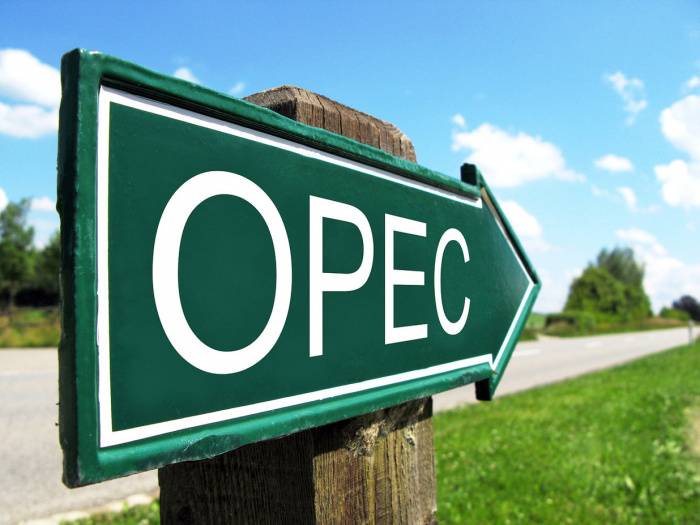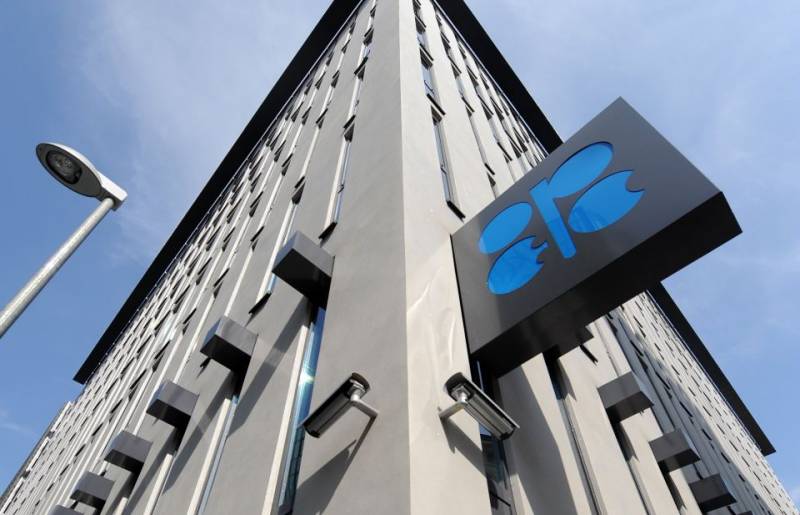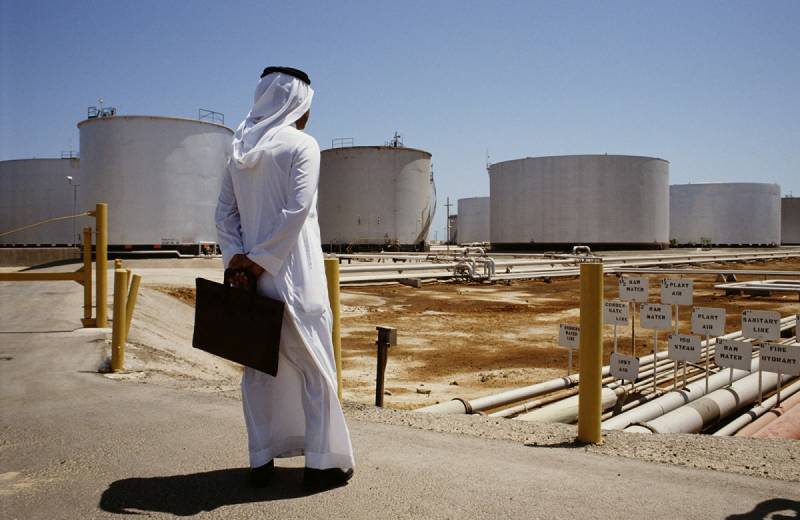How many pluses does OPEC have in stock?
Only 100 thousand less
Last Saturday, OPEC + energy ministers agreed to extend agreements to reduce oil production at least until the end of July. At the same time, the reduction level of 9,7 million barrels per day was reduced to 9,6 million, which is important primarily in psychological terms. It is very important to confirm the positive trend, although most of the reserve oil storage facilities around the world are on the verge of overflow.
Despite the fact that the Russian Minister of Energy, Alexander Novak, admitted the possibility of early completion of the transaction, there are very few real reasons for this now. Both Konstantin Simonov, Vice-Rector of the Financial University under the Government of the Russian Federation, and the Director of the Center for Energy Research at the Institute for Pricing and Regulation of Natural Monopolies of the Higher School of Economics, Vyacheslav Kulagin, are sure of this.
On Monday, at an online conference at MIA Russia Today, experts commented on the OPEC + agreement of June 6. The main thing, according to experts, that in the conditions of the excess of supply over demand formed over a long period of time, the agreement itself remains beneficial for almost all of its participants.
However, there are still few reasons for long-term optimism, K. Simonov believes. A decrease in the global production level by 9,6 or 9,7 million barrels per day does not remain paper only because Saudi Arabia and its regional allies promptly close unselected quotas of countries such as Iraq, Nigeria, Angola and Kazakhstan.
At the same time, the decline in shale oil production, directly related to the fall in hydrocarbon prices, also helps to level the Mexican factor. Recall that in early April, the current quotas from the OPEC agreement with several pluses were adopted not only by the members of this alliance, but also by all oil-producing countries.
Then it was the difficulties with the oil shale that helped the US president make a beautiful gesture. At the conclusion of the OPEC + US agreement, more precisely, personally Donald Trump, effectively took over the quota that Mexico did not want to accept. Later, the American president explained that he had made an unusually quick decision, primarily because life itself dictated its implementation. Specifically, it meant the closure of a number of shale deposits due to a sharp drop in profitability, which in any case led to a significant decrease in US production levels.
Soon, the American leader did not hesitate to expand this explanation on his Twitter page:
It is characteristic that Donald Trump demonstrated his generosity in those days when the United States for the first time in recent years, if not for the whole history, took the lead in terms of oil production, reaching 13 million barrels per day.
Barrels and Gentlemen
Almost all OPEC agreements on reduction of production quotas are traditionally not binding, in connection with which Vyacheslav Kulagin even called them "gentlemen". He reminded that transactions in the OPEC + format allow their participants not only to exit them at any time, and to do this on the basis of not global market conditions, but internal monitoring of the industry.
At the same time, without even leaving OPEC itself and the last deal, a number of countries continue to throw surplus export oil to the markets. At the Vienna meeting on Saturday, almost for the first time in the history of the cartel, four countries that did not adhere to their obligations were directly named, with citing unpleasant statistics.
Iraq was the first to get obstructed by its oil production colleagues, for whom a 30 percent underfulfillment of the quota plan turned out to be an opportunity to put up to 1 million barrels per day on the markets. Nigeria, with its much more solid scale of total oil production, did not choose a quota of reduction of 24%, slightly less impressive indicators from Angola and Kazakhstan.
Russia did not get on the list of violators, despite the fact that in May it could not fully fit into the agreed quota. As V. Kulagin noted, we were given relief in view of the difficulties with decommissioning the wells and taking into account the June compensation. Russia is currently reaching a daily production level of about 8,5 million barrels, which, compared with March 11,3-11,5 million, gives an almost 20 percent decrease.
Reaching the maximum level of decline already signed in June by our country retains good chances for us to return, believes K. Simonov, he recalled that from July the total reduction quotas in the OPEC + transaction are planned to be reduced from 9,7 to 7,7 million barrels, and since 2021 - up to 5,8 million, and possibly more.
Sheikh said sheikh did
The volatility of the oil market is particularly palpable in conjunction with the fact that the decisions of the ruling family in Saudi Arabia are often almost unpredictable. Having much more comfortable conditions for manipulating production levels compared to Russia, the sheikhs from Riyadh unsuccessfully tried to push it out of the market due to unprecedented dumping.
However, they are not devoid of adherence to this word and have now done almost everything in their power so that the latest OPEC + agreement does not turn into a paper formality. So, the level of reduction quotas, which currently adheres to Saudi Arabia, has reached 4,4 million barrels. Riyadh's closest oil cartel allies, Oman, the UAE, Kuwait and Bahrain, have assumed a total quota of 1,2 million barrels.
The Saudi princes seem to have burned very badly in the dumping game and are now considering the drop in global oil demand by 19,9 million barrels at once. They cannot ignore the fact that even before the pandemic, an oversupply of extractive industries around the world reached 2-3 million barrels.
At the same time, in Riyadh hardly anyone may be interested in the fact that Russia has legally established a budget rule for itself, which indicates the cut-off price for deductions to reserve funds. It is known to be equal to 42,5 dollars per barrel. However, Konstantin Simonov generally called the “sheikh factor” among the main ones that are now shaping the market environment.
In addition to the sheikhs, the indiscipline of Nigeria is affecting, which so far has been managed to smooth out due to other countries and a simple drop in production in the United States. On the other hand, trends in increasing demand associated with the restoration of vital activity after forced quarantine are beginning to positively influence.
In principle, experts believe that the unpredictability of the sheikhs has not disappeared. They will need to be thankful as soon as they stop making a secret from the terms of large-scale futures contracts, which took place in the spring. However, the announcement of July prices is yet again delayed.
The deal is alive, the deal will live
In March-April, oil-producing countries managed to feel for themselves what it means to live without a deal at all. Most likely, this was the reason for operational reconciliation with Russia, as well as with Kazakhstan and a number of less significant participants in the deal. These countries were not so much allowed to save face as they were given to understand that nobody was planning to push them out of the “oil club” because of one crisis, albeit such a strong one.
After several years of uneasy partnership at OPEC, it seems that they realized that purely local, we can say, club decisions, in our time there is not much to be achieved. Moreover, two powers from the big “oil trio” —Russia and the USA — clearly do not plan to join OPEC. In the meantime, it is very difficult to predict how an almost 20 percent reduction in production will affect the Russian oil industry, and it will be very protracted.
In itself, the fact of the extension of the OPEC + transaction until the end of July, according to experts, should be regarded as positive, despite the fact that the agreement remains very unstable.
Many countries, including a recovering China, are now striving to use successful conditions in order to fill the oil storage tanks to the maximum. With a jump in demand, they can be used not only for the needs of a growing economy again, but also for marketing.
However, overfilling the vaults leads to the fact that oil traders are tied hands due to the lack of a kind of price damper. The removal from the market of excessive volumes of raw materials has always been a convenient method for manipulating prices, most often for maintaining quotes.
Meanwhile, a strong increase in oil prices, which cannot be ruled out in the event of a rapid recovery of the world's leading economies, is fraught with some danger. Moreover, the danger to those countries in which oil production remains the core industry. The fact is that high oil prices immediately increase the profitability of American shale projects, the restart of which is not a very big problem.
In this case, it is shale that can eventually turn into a semblance of a world-wide industrial dictator. The Americans are not averse to doing something similar with LNG (liquefied natural gas), but we must not forget that its prime cost will be much higher for a very long time than that of pipeline gas.



Information